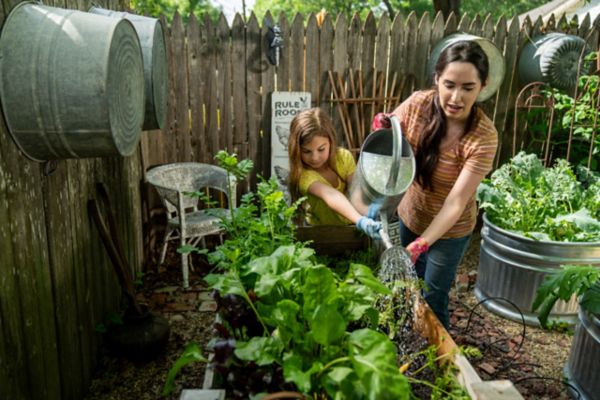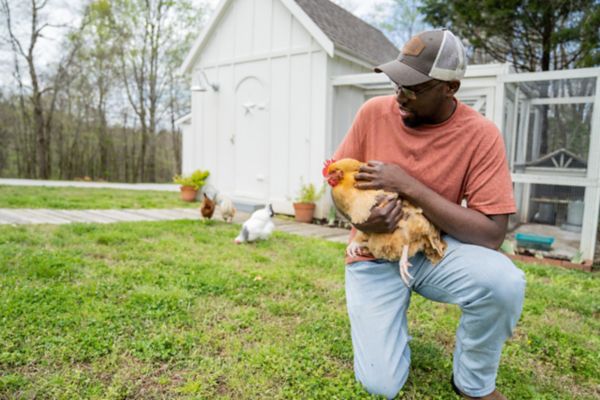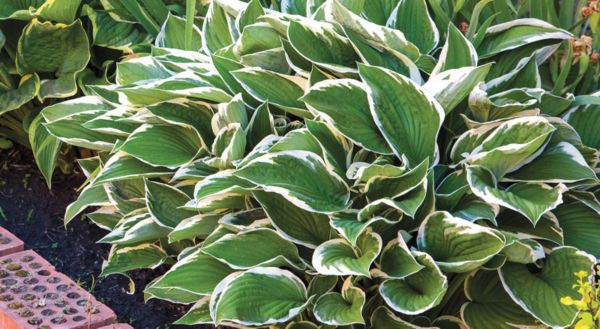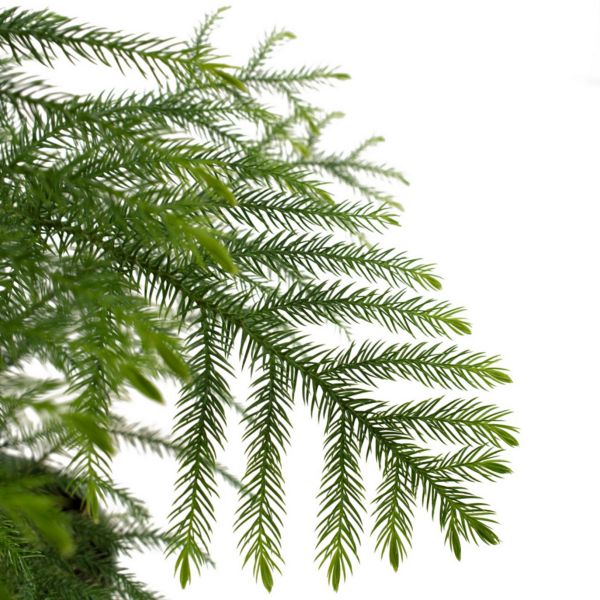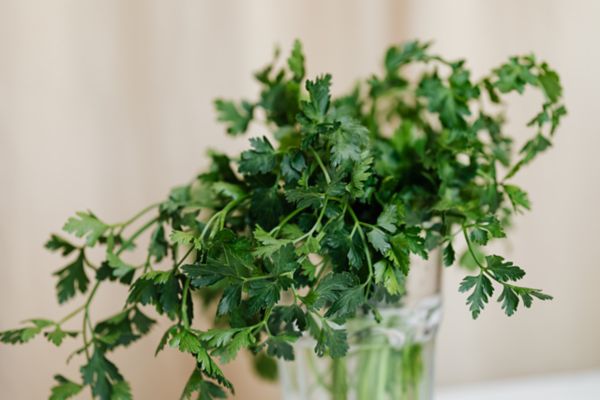Raising Backyard Chickens and Gardening
Authored by Leah Chester-Davis
Combining the raising of backyard chickens and gardening has been around for ages and continues to be popular today. Chickens not only produce eggs, one of the most wholesome foods around, they help decrease the harmful insect population, and their manure can be used to fertilize gardens, which helps you produce thriving plants. Chickens also can be quite entertaining to watch.

Gardening with chickens takes some planning and even with the best advice and strategies it will involve some trial and error on your part. The rewards are many. Here are a few considerations:
- Preparation and planning
- Chicken coop site
- Habits of chickens
- Garden or landscape goals
Read on to learn more about planning garden-raising around your flock.
Prep and planning
Check your municipality regulations
If you live in the country, this likely won’t be an issue but if you are in a suburban or urban area, there may be regulations when it comes to raising chickens in your backyard. Before investing in a chicken coop and run, check any regulations, requirements, and guidelines.
Consider the type of gardening you most enjoy
Is the appearance of your landscape a priority for you? Do you grow primarily ornamental plants? Do you enjoy raising a vegetable garden? If you allow your chickens outside of their chicken run to free range on your lawn, you will need to consider whether you wish to keep them contained in a certain area and away from certain plants. Chickens can benefit from getting the chance to free range on occasion outside their chicken pen and onto a lush lawn. Deciding your interests and priorities is important when considering combining the two. For example, it may be difficult to keep a picture-perfect landscape with free-range chickens but that doesn’t mean you’re out of luck. It may take some experimenting to figure out which plants they avoid.
Explore online inspiration
Chicken coops and runs need not be unsightly affairs that you prefer to keep hidden. Rather, they can blend quite nicely into the landscape when plants are installed along the outside perimeter, and they become a joy to not only you but to your neighbors. Ideas abound on Pinterest, Instagram, and magazines. With any gardening project, plant selections and configurations are plentiful. Anchor plants such as shrubs paired with climbing roses, perennials, annuals, and herbs can result in a striking area.

Coop site
Consider how to situate the chicken coop and run, its proximity to your garden, and how it will look in relation to the rest of your landscape. This is important for your enjoyment, and it may make a big difference in keeping your neighbors happy, too. Landscaping around the outside perimeter of the chicken pen can add color, interest, and enjoyment to your landscape. Trees, shrubs, perennials, annuals, and herbs provide many options to create a beautiful landscape.
Site near existing shade or use plants to add shade on the outside perimeter of the chicken pen. During hot summers, chickens will benefit from having shade readily available. While the inside of their coop may be shaded, it’s crucial to provide shade in any outdoor areas where they spend time. Plants on the outside perimeter of their pen, particularly on the west side, will help provide shade during the hottest part of the day.
Include plants as windbreaks. In colder climates where winter winds may become quite harsh, windbreaks can make a big difference. Consider a row of tall evergreens or even ornamental grasses to help add some protection.
Install proper fencing
Chickens like to scratch and peck in and around plants and they can’t distinguish what is off-limits. When you’ve carefully tended a plant or you’re waiting to pluck a just-ripe tomato off the vine, the last thing you want to find is that marauding chickens have made a salad bar of your garden. A vegetable garden must be protected much of the year, except during the times of year when chickens might be employed to help scatter compost and mulch in your planting area, such as during the fall. Various fencing options are available including portable poultry fencing which might be the perfect solution. When it comes to that expression, “good fences make good neighbors,” that is good advice to heed when it comes to chickens as well.
Protect plants
Protect plants with hardscape material, hardware cloth, wire cages, or cloches. According to Kathy Shea Mormino, The Chicken Chick, one technique to protect plants is to use pavers, bricks, or rocks around the base of landscape plants to keep chickens from scratching and digging the roots. This is particularly important with young, tender plants. Often you will find that when a plant is established it may not be bothered at all by your flock. The best advice is to keep an eye on both your plants and your chickens and take any necessary measures. If you are a gardener who adds mulch to your landscape beds, add a layer of hardware cloth beneath the mulch to deter the chickens from scratching the mulch out of your beds. Small wire cages or cloches can also be used to help protect young, tender plants.

Living with chickens
Be aware of the habits of chickens. Chickens like to scratch and peck. And any area with dirt or bare grass or tender plants with fresh soil invites a dust bath. If you do not want them to treat your landscape as their personal salad bar and spa resort, think ahead before turning them loose in your garden. Even mulched landscape beds are like a magnet for chickens, and they will make short work of rearranging carefully mulched beds that likely won’t meet with your approval. Put new plants in the ground and guess where chickens will head?
Plants to grow to supplement chicken feed.
Leafy greens, nasturtiums, and cucurbits are among the plants that can supplement your chickens’ diets. Gail shares information on plants to supplement chicken feed along with cold-season crops.
What about toxic plants?
There are plants that are listed as toxic to backyard chickens and ducks though poultry expert Gail Damerow says that “unless chickens are starving, they basically won’t be interested in toxic plants simply because most toxic plants taste bad.” She advises avoiding plants that have toxic berries or seeds that chickens might be tempted to peck, things like castor bean, pokeberry, or vetch.
Avoid using chemicals as much as possible.
Backyard chickens are often family pets and a safe environment for both them and your family is important. Even the most careful gardener sometimes has plants that are bothered by insect pests and diseases. Use natural or organic treatment methods. Give your plants a good start by providing good, healthy soil and employing good management practices such as keeping weeds suppressed and removing any diseased plant material out of the garden.
Move chicken waste to the compost pile.
Any chicken waste mixed with pine shavings, straw, or other bedding material used in the coop and in nesting boxes can be moved to the compost bin. It is considered green material and will need to decompose before adding to the garden, particularly if used in edible gardens. When decomposed, it turns into a rich compost that will add nutrients to the garden and decrease the need for artificial fertilizers.

Just as with any other gardening endeavor, it takes giving it a try to determine what works best. Some chickens may be attracted to certain plants and dig around them, eat them, and sit on them. They may leave other plants alone. The key is trying different things, observing your chickens’ behavior, implementing measures to protect your plants, and creating a space that keeps your chickens happy and ensures you enjoy it as part of your landscape.
In this series, we share more from Kathy Shea Mormino, The Chicken Chick, author of The Chicken Chick’s Guide to Backyard Chickens, and Gail Damerow, author of several poultry care books, including the popular Storey’s Guide to Raising Chickens and The Chicken Health Handbook. She is also the poultry expert for Tractor Supply’s Life Out Here columns and her own blog.


